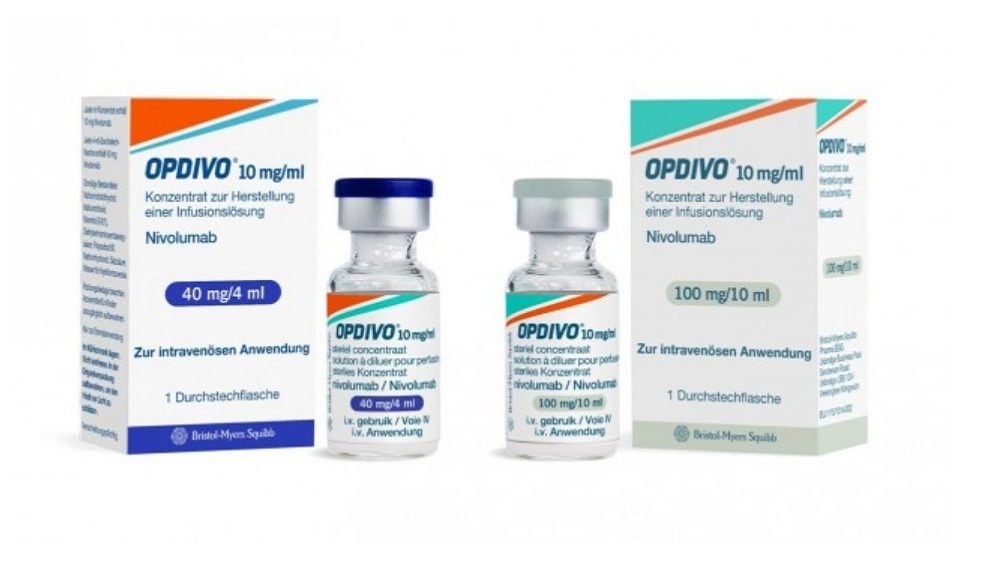Bristol-Myers Squibb Company announced that Opdivo (nivolumab) received approval from the U.S. FDA as the first and only Immuno-Oncology treatment option for patients with metastatic small cell lung cancer (SCLC) whose cancer has progressed after platinum-based chemotherapy and at least one other line of therapy.
Approval for this indication has been granted under accelerated approval based on overall response rate (ORR) and duration of response (DOR). Continued approval for this indication may be contingent upon verification and description of clinical benefit in confirmatory trials.
“At Bristol-Myers Squibb, we recognize the critical need to provide patients with cancer therapies that may offer more durable responses – particularly for those living with hard-to-treat, aggressive diseases like small cell lung cancer,”2 said Sabine Maier, M.D., development lead, thoracic cancers, Bristol-Myers Squibb. “This approval builds on our heritage of bringing Immuno-Oncology therapies to patients with other types of thoracic cancers. It also reinforces our commitment to bringing transformative treatments to patients in urgent need of effective new options.”
Opdivo is associated with the following Warnings and Precautions: immune-mediated pneumonitis, colitis, hepatitis, endocrinopathies, nephritis and renal dysfunction, skin adverse reactions, encephalitis, other adverse reactions; infusion reactions; and embryo-fetal toxicity.
This approval for Opdivo in patients with SCLC whose cancer has progressed after two or more prior lines of therapy was granted priority review from the FDA.
The approval was based on data from the SCLC cohort of the ongoing Phase 1/2 CheckMate -032 study evaluating Opdivo in patients who experienced disease progression after platinum-based chemotherapy.1 Of 109 patients receiving Opdivo after platinum-based chemotherapy and at least one other prior line of therapy, 12% (n=13/109; 95% CI: 6.5-19.5) responded to treatment based on assessment by a Blinded Independent Central Review (BICR), regardless of PD-L1 expression. Twelve patients had a partial response (11%), and one patient had a complete response (0.9%).1,3 Among these responders, the median DOR was 17.9 months (95% CI: 7.9-42.1; range: 3.0-42.1 months).3 Opdivo was discontinued in 10% of patients, and one dose was withheld in 25% of patients for an adverse reaction.1 Serious adverse reactions occurred in 45% of patients.1 The approved dosing for Opdivo in this indication is 240 milligrams administered every 2 weeks by intravenous infusion until disease progression or unacceptable toxicity.
“While Immuno-Oncology innovations have dramatically changed how oncologists approach certain cancers, we have had limited progress for patients with small cell lung cancer,” said Leora Horn, M.D., M.Sc., associate professor of medicine, Ingram associate professor of cancer research, director of the thoracic oncology program and assistant vice chairman for faculty development, Vanderbilt University Medical Center. “Today’s approval of nivolumab is particularly exciting considering it is the first checkpoint inhibitor approved for these specific patients, and now we can finally treat this devastating disease from a different angle.”
Small cell lung cancer is one of two main types of lung cancer and accounts for about 10% to 15% of all lung cancers.4 Small cell lung cancer is an aggressive disease, and symptoms often are not detected until the cancer is at an advanced stage.2 In the United States, about 27,000 cases of SCLC are expected to be diagnosed in 2018.5 From the time of diagnosis, five-year survival rates for extensive stage SCLC, or Stage IV, are about 2%.
“Small cell lung cancer can be a very challenging disease, particularly for those who have already been through multiple types of treatment, as most patients relapse within a year of diagnosis,”7 said Andrea Ferris, president and chairman of LUNGevity Foundation. “This approval marks a major milestone for the patients touched by this unrelenting disease and may motivate them to pursue further treatment where there previously were no other approved options.”
Approval Based on CheckMate -032 Trial
CheckMate -032 is a Phase 1/2 multicenter, multi-cohort, open-label and ongoing trial, including 245 patients with SCLC who had experienced disease progression after platinum-based chemotherapy treated with Opdivo monotherapy.1,8 Efficacy was based on 109 patients who had experienced disease progression after platinum-based chemotherapy and at least one other prior line of therapy.1 These patients received 3 mg/kg of Opdivo given by intravenous infusion over 60 minutes every 2 weeks and were included regardless of their PD-L1 status.1 Infusions were administered to patients until disease progression or unacceptable toxicity. The trial excluded patients with autoimmune disease, medical conditions requiring systemic immunosuppression, symptomatic interstitial lung disease, or untreated brain metastasis.1 Patients with treated brain metastases were eligible if neurologically stable.
The first tumor assessments were conducted 6 weeks after the first dose and continued every 6 weeks for the first 24 weeks and every 12 weeks thereafter.1 The major efficacy outcome measures were confirmed ORR, which was further characterized by DOR, as assessed by a BICR.1 The median duration of therapy in patients treated with Opdivo in the CheckMate -032 trial was 1 month (range: 0 to 44.2+ months).1 Seventeen percent of patients received Opdivo for greater than 6 months, and 9% of patients received Opdivo for greater than one year.
About the Bristol-Myers Squibb and Ono Pharmaceutical Collaboration
In 2011, through a collaboration agreement with Ono Pharmaceutical Co., Bristol-Myers Squibb expanded its territorial rights to develop and commercialize Opdivo globally, except in Japan, South Korea and Taiwan, where Ono had retained all rights to the compound at the time. On July 23, 2014, Ono and Bristol-Myers Squibb further expanded the companies’ strategic collaboration agreement to jointly develop and commercialize multiple immunotherapies – as single agents and combination regimens – for patients with cancer in Japan, South Korea and Taiwan.
About Bristol-Myers Squibb
Bristol-Myers Squibb is a global biopharmaceutical company whose mission is to discover, develop and deliver innovative medicines that help patients prevail over serious diseases. For more information about Bristol-Myers Squibb, visit us at BMS.com.



















